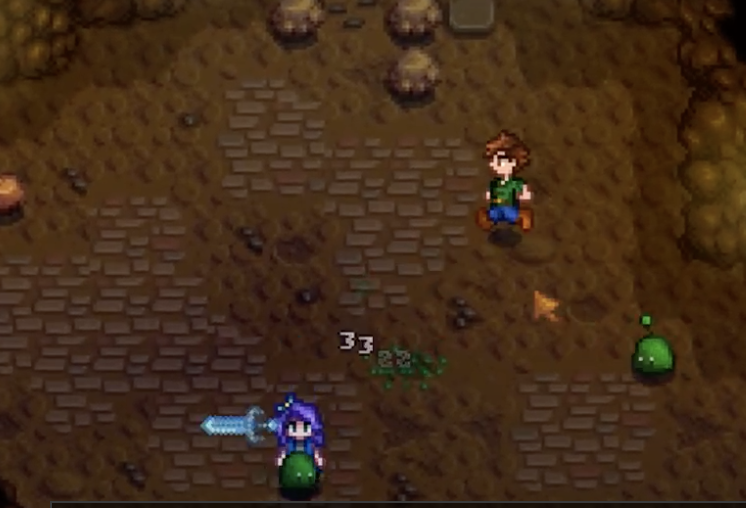What I want to explore in this blog post is an NPC companion mod, in which the avatar can select another NPC to be with him and use this additional person’s help to do work more efficiently. After playing this mod, I came to see how it created power dynamics between the avatar and other villagers that were absent in the original Stardew Valley.
In this mod, dialogues are totally rewritten. The avatar can start a conversation with anyone he chooses in the town and invite them to join his adventure. Most of the time, villagers will say yes and end up following the avatar to wherever he goes. Besides choosing whom to go with, it is also up to the player to decide when to leave his companions and can easily let them go easily without a reason. This full control over both the avatar and other NPCs expands the player’s authority in the game and changes the power dynamics between the avatar and his surrounding environment. In the original version, the player builds up everything with his own effort, and he keeps a respectful distance with other NPCs in the town. Players celebrate their own achievements and earn every penny using their effort and wisdom. As a simulacrum of the real world, Stardew Valley emphasizes individual experiences with limited interactions with others. Players play this cozy game with a single focus on their own avatar’s performance and have a conversation with themselves. This mod, in contrast, complicates the relationship between the avatar and others and forces players to interact and collaborate with other NPCs. This design with a focus on relationship building deviates from the original game’s focus and changes people’s gaming experience.
As a mod that preserves the original aesthetic, it appears to create the same atmosphere as the original, and people tend to see this additional NPC as a great companion to the avatar. However, totally contrary to people’s first impression, this mod adopts mechanism that encourages the player treat their companion NPC not as a friend but as free labor. In the mod, different NPCs have different puffs, such as bringing more luck, having more speed, which become the main distinctions among them and the primary criterion for the players to decide on who to go out with. This depiction of each character with a pure focus on the benefits they could bring, rather than their personalities, sets the ground for this labor relationship the avatar would build with others. In the playthroughs that I watched, the primary logic behind every player’s choice of companion NPC is always to think about what benefits they could bring.

The female companion NPC does all the work
And that is not the end of it. This game takes a more extreme stance by coming up with design that stimulates the players to exploit other NPCs and gain pleasure from it. If the avatar and his companion NPC want to take the bus to another destination, only the avatar can be on the bus, while the other NPC has to chase after the bus and runs the whole time. In one playthrough video that I watched, the player gained a lot of evil pleasure from this design and had his avatar take the bus multiple times only for the purpose to see his companion NPC running.

The companion NPC runs behind the bus
In a nutshell, one might think that, by allowing the avatar to have a companion, this NPC companion mod should share the same positive atmosphere with the original version. However, it does not take long for the game to reveal its true intention. Rather than having a friend to accompany the avatar, the game adopts the mechanism that encourages the players to exploit the companion NPCs and treat them as free labor. By closely studying this mod, we get to see how seemingly small changes could end up totally ruining the atmosphere of the original game and bringing players fully different gaming experience. After carefully studying this mod, I started to pay more respect to the original Stardew Valley and saw the huge amount of effort game designers put into the game to make it a cohesive piece and generate the effect on players that they intended.
.
